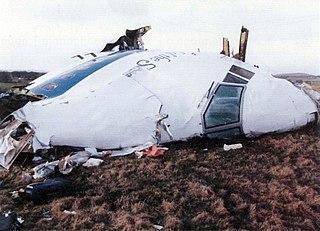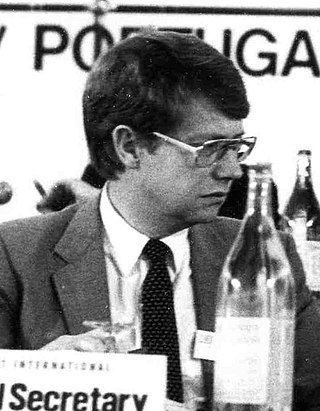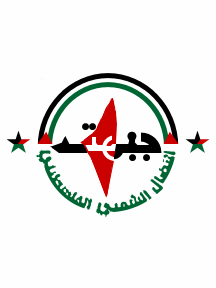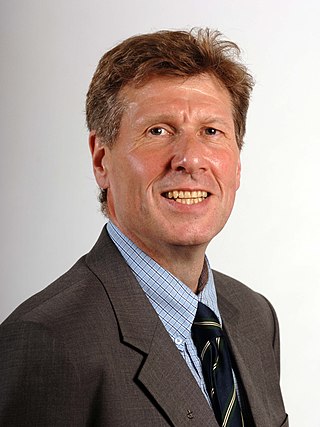Related Research Articles

The Scottish court in the Netherlands was a special sitting of the High Court of Justiciary set up under Scots law in a former United States Air Force base, Camp Zeist near Utrecht, in the Netherlands, for the trial of two Libyans charged with 270 counts of murder in connection with the bombing of Pan Am Flight 103 over Lockerbie, Scotland, on 21 December 1988. A school on the former base was converted into a judicial court for the trial.

Abdelbaset Ali Mohamed al-Megrahi was a Libyan who was head of security for Libyan Arab Airlines, director of the Centre for Strategic Studies in Tripoli, Libya, and an alleged Libyan intelligence officer. On 31 January 2001, Megrahi was convicted, by a panel of three Scottish judges sitting in a special court at Camp Zeist in the Netherlands, of 270 counts of murder for the bombing of Pan Am Flight 103 over Lockerbie, Scotland, on 21 December 1988 and was sentenced to life imprisonment. His co-accused, Lamin Khalifah Fhimah, was found not guilty and was acquitted.
The Pan Am Flight 103 bombing trial began on 3 May 2000, more than 11 years after the destruction of Pan Am Flight 103 on 21 December 1988. The 36-week bench trial took place at a specially convened Scottish Court in the Netherlands set up under Scots law and held at a disused United States Air Force base called Camp Zeist near Utrecht.

The investigation into the bombing of Pan Am Flight 103 began at 19:03 on 21 December 1988, when Pan Am Flight 103, en route from Frankfurt to Detroit with stopovers in London and New York City, was blown up over Lockerbie in Dumfries and Galloway, Scotland. The perpetrators had intended the plane to crash into the sea, destroying any traceable evidence, but the late departure time of the aircraft meant that its explosion over land left a veritable trail of evidence. The investigation led to the prosecution, conviction, and imprisonment of Abdelbaset al-Megrahi.

Pan Am Flight 103 conspiracy theories suggest a number of possible explanations for the bombing of Pan Am Flight 103 on December 21, 1988. Some of the theories preceded the official investigation by Scottish police and the FBI; others arose from different interpretation of evidence presented at Libyan agent Abdelbaset al-Megrahi's 2000–2001 trial; yet others have been developed independently by individuals and organisations outside the official investigation.

The Scottish Criminal Cases Review Commission (SCCRC) is an executive non-departmental public body of the Scottish Government, established by the Criminal Procedure (Scotland) Act 1995.

Bernt Wilmar Carlsson was a Swedish social democrat and diplomat who served as Assistant-Secretary-General of the United Nations and United Nations Commissioner for Namibia from July 1987 until he died on Pan Am Flight 103, which was blown up over Lockerbie, Scotland on 21 December 1988. Abdelbaset al-Megrahi was subsequently convicted of 270 counts of murder in connection with the bombing and sentenced to life imprisonment.

Matthew Kevin Gannon was a CIA officer who was killed in the bombing of Pan Am Flight 103 over Lockerbie, Scotland, in 1988.

The Palestinian Popular Struggle Front is a Palestinian political party. Samir Ghawshah was elected secretary-general of PPSF in 1971 and led it until his death in 2009. He was succeeded by Ahmed Majdalani on 8 August 2009.
William Taylor, KC has been a Scottish advocate since 1971 and now KC since 1986. He has also been a barrister in England and Wales since 1990 and a Queen's Counsel there since 1998. He has specialised in criminal defence work since the 1980s.
Robert Black is a Scottish lawyer who is Professor Emeritus of Scots Law at the University of Edinburgh. He has been an Advocate in Scotland since 1972, was in practice at the Bar and became a QC in 1987.
Herbert Swire, known better as Jim Swire, is an English doctor best known for his involvement in the aftermath of the 1988 bombing of Pan Am Flight 103, in which his daughter Flora was killed. Swire lobbied toward a solution for the difficulties in bringing suspects in the original bombing to trial, and later advocated the retrial and release of Abdelbaset al-Megrahi, the originally convicted suspect in the case.

Tony Gauci was the proprietor of Mary's House, a clothes shop in Sliema, Malta, who was a witness in the prosecution of Abdelbaset al-Megrahi in relation to the Lockerbie Bombing.
Abdul Majid Giaka is an alleged double agent who defected from Jamahiriya el-Mukhabarat and became a CIA asset in August 1988.

Pan Am Flight 103 (PA103/PAA103) was a regularly scheduled Pan Am transatlantic flight from Frankfurt to Detroit via a stopover in London and another in New York City. The transatlantic leg of the route was operated by Clipper Maid of the Seas, a Boeing 747 registered N739PA. Shortly after 19:00 on 21 December 1988, while the aircraft was in flight over the Scottish town of Lockerbie, it was destroyed by a bomb, killing all 243 passengers and 16 crew in what became known as the Lockerbie bombing. Large sections of the aircraft crashed in a residential street in Lockerbie, killing 11 residents. With a total of 270 fatalities, it is the deadliest terrorist attack in the history of the United Kingdom.
Lockerbie: The Story and the Lessons is a book by aviation security expert Rodney Wallis on the Pan Am 103/Lockerbie bombing case, focusing upon the civil litigation trial brought by surviving family members against the now defunct Pan American World Airways.

Hans Köchler's Lockerbie trial observer mission stemmed from the dispute between the United Kingdom, the United States, and Libya concerning arrangements for the trial of two Libyans accused of causing the explosion of Pan Am Flight 103 over Lockerbie on 21 December 1988.

Abdelbaset al-Megrahi was convicted on 31 January 2001 by a special Scottish Court in the Netherlands for the bomb attack on Pan Am Flight 103 on 21 December 1988 over Lockerbie. After he was diagnosed with terminal prostate cancer, he was released from prison on compassionate grounds on 20 August 2009, having served 8½ years of a life sentence. His release was authorised by Scottish Justice Secretary Kenny MacAskill. The decision attracted significant news coverage, engendering widespread celebration in Libya, a largely hostile reaction in the United States and a more equally divided reaction in Britain.
On 22 July 1985, two bombs exploded in a terrorist attack in Copenhagen, Denmark. One of the bombs exploded near the Great Synagogue and a Jewish nursing home and kindergarten, and another at the offices of Northwest Orient Airlines. At least one more bomb, planned for the El Al airline offices, was discovered. One person was killed and 26 people were injured in the attacks. Sweden-based Palestinians Abu Talb and Marten Imandi were sentenced to life imprisonment in Sweden for the bombings, which were part of a series of attacks in 1985 and 1986, while two co-conspirators received lesser sentences of one and six years imprisonment.
Peter Thomas Stanley Dix was an Irish Olympic sailor who competed in the 470 in 1976.
References
- ↑ David Leppard (2007-07-01). "Unpicking the Lockerbie truth". London: timesonline. Archived from the original on December 3, 2008. Retrieved 2009-10-26.
- ↑ "Pan Am incriminee Talb freed". The Firm. Archived from the original on 2009-10-23. Retrieved 2009-10-26.
- 1 2 3 Wines, Michael (1989-12-24). "Portrait of Pan Am Suspect: Affable Exile, Fiery Avenger". The New York Times . Retrieved 2007-10-24.
- 1 2 Deutsch, Anthony (2000-11-11). "Palestinian terrorist expected to deny role in Lockerbie bombing" . The Independent . London. Archived from the original on 2012-10-13. Retrieved 2007-10-24.
- 1 2 3 "Pan Am Bombing Suspect Convicted in Other Attacks". Associated Press. 1989-12-22. Retrieved 2007-10-24.
- ↑ John Davison, "Lockerbie bombers shifted blame to Libya, claim top investigators", Exaro, 11 March 2014
- ↑ "Lockerbie lawyers quiz Palestinian". BBC News. 2000-11-14. Retrieved 2009-10-26.
- ↑ Lucy Adams. "Lockerbie suspect can still be brought to trial". Glasgow Herald . Retrieved 2009-10-26.